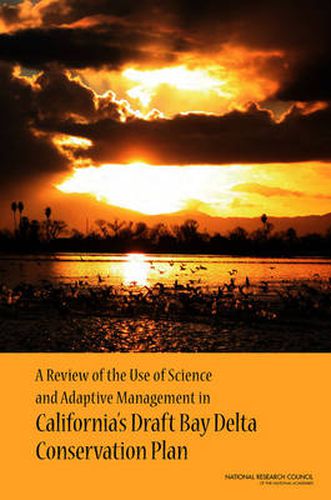Readings Newsletter
Become a Readings Member to make your shopping experience even easier.
Sign in or sign up for free!
You’re not far away from qualifying for FREE standard shipping within Australia
You’ve qualified for FREE standard shipping within Australia
The cart is loading…






The San Francisco Bay Delta Estuary is a large, complex estuarine ecosystem in California. It has been substantially altered by dikes, levees, channelization, pumps, human development, introduced species, dams on its tributary streams and contaminants. The Delta supplies water from the state’s wetter northern regions to the drier southern regions and also serves as habitat for many species, some of which are threatened and endangered. The restoration of water exacerbated tensions over water allocation in recent years, and have led to various attempts to develop comprehensive plans to provide reliable water supplies and to protect the ecosystem. One of these plans is the Bay Delta Conservation Plan (BDCP). The report, A Review of the Use of Science and Adaptive Management in California’s Draft Bay Delta Conservation Plan, determines that the plan is incomplete in a number of important areas and takes this opportunity to identify key scientific and structural gaps that, if addressed, could lead to a more successful and comprehensive final BDCP. The plan is missing the type of structure usually associated with current planning methods in which the goals and objectives are specified, alternative measure for achieving the objectives are introduced and analyzed, and a course of action in identified based on analytical optimization of economic, social, and environmental factors. Yet the panel underscores the importance of a credible and a robust BDCP in addressing the various water management problems that beset the Delta. A stronger, more complete, and more scientifically credible BDCP that effectively integrates and utilizes science could indeed pave the way toward the next generation of solutions to California’s chronic water problems.
$9.00 standard shipping within Australia
FREE standard shipping within Australia for orders over $100.00
Express & International shipping calculated at checkout
The San Francisco Bay Delta Estuary is a large, complex estuarine ecosystem in California. It has been substantially altered by dikes, levees, channelization, pumps, human development, introduced species, dams on its tributary streams and contaminants. The Delta supplies water from the state’s wetter northern regions to the drier southern regions and also serves as habitat for many species, some of which are threatened and endangered. The restoration of water exacerbated tensions over water allocation in recent years, and have led to various attempts to develop comprehensive plans to provide reliable water supplies and to protect the ecosystem. One of these plans is the Bay Delta Conservation Plan (BDCP). The report, A Review of the Use of Science and Adaptive Management in California’s Draft Bay Delta Conservation Plan, determines that the plan is incomplete in a number of important areas and takes this opportunity to identify key scientific and structural gaps that, if addressed, could lead to a more successful and comprehensive final BDCP. The plan is missing the type of structure usually associated with current planning methods in which the goals and objectives are specified, alternative measure for achieving the objectives are introduced and analyzed, and a course of action in identified based on analytical optimization of economic, social, and environmental factors. Yet the panel underscores the importance of a credible and a robust BDCP in addressing the various water management problems that beset the Delta. A stronger, more complete, and more scientifically credible BDCP that effectively integrates and utilizes science could indeed pave the way toward the next generation of solutions to California’s chronic water problems.